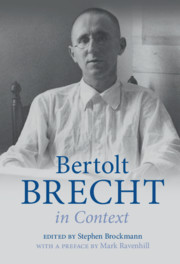Book contents
- Bertolt Brecht in Context
- Bertolt Brecht in Context
- Copyright page
- Contents
- Figure
- Notes on Contributors
- Chronology
- Abbreviations
- Preface
- A Note on Brecht in English
- Introduction
- Part I Brecht’s World
- Chapter 1 Brecht’s Augsburg Years
- Chapter 2 Models for Epic Theater from the Munich Years:
- Chapter 3 Brecht in the Weimar Republic
- Chapter 4 Brecht’s Emergence as a Young Poet
- Chapter 5 Brecht and Music: The Fly in the Amber
- Chapter 6 Brecht and Political Theater
- Chapter 7 Brecht and Germany
- Chapter 8 “[She] made suggestions. We took them”: Bertolt Brecht’s Women Collaborators
- Chapter 9 Brecht’s Interviews
- Chapter 10 Brecht and Exile
- Chapter 11 Brecht and the German Democratic Republic
- Chapter 12 The Berliner Ensemble
- Part II Brecht’s Work
- Part III The World’s Brecht
- Concise Bibliography
- Index
Chapter 8 - “[She] made suggestions. We took them”: Bertolt Brecht’s Women Collaborators
from Part I - Brecht’s World
Published online by Cambridge University Press: 28 May 2021
- Bertolt Brecht in Context
- Bertolt Brecht in Context
- Copyright page
- Contents
- Figure
- Notes on Contributors
- Chronology
- Abbreviations
- Preface
- A Note on Brecht in English
- Introduction
- Part I Brecht’s World
- Chapter 1 Brecht’s Augsburg Years
- Chapter 2 Models for Epic Theater from the Munich Years:
- Chapter 3 Brecht in the Weimar Republic
- Chapter 4 Brecht’s Emergence as a Young Poet
- Chapter 5 Brecht and Music: The Fly in the Amber
- Chapter 6 Brecht and Political Theater
- Chapter 7 Brecht and Germany
- Chapter 8 “[She] made suggestions. We took them”: Bertolt Brecht’s Women Collaborators
- Chapter 9 Brecht’s Interviews
- Chapter 10 Brecht and Exile
- Chapter 11 Brecht and the German Democratic Republic
- Chapter 12 The Berliner Ensemble
- Part II Brecht’s Work
- Part III The World’s Brecht
- Concise Bibliography
- Index
Summary
From the later 1920s, Brecht developed a Marxist critique of the theater apparatus and began to experiment on the margins of, and outside, commercial theater. It was not until after World War II, when he founded the Berliner Ensemble, that he finally had the opportunity to control the means of theatrical production. The Berliner Ensemble’s entire approach was underpinned by a holistic understanding of political theater. This extended from actor training to outreach activities with audiences, going far beyond the argument or subject matter of any individual play.
Keywords
- Type
- Chapter
- Information
- Bertolt Brecht in Context , pp. 73 - 80Publisher: Cambridge University PressPrint publication year: 2021

